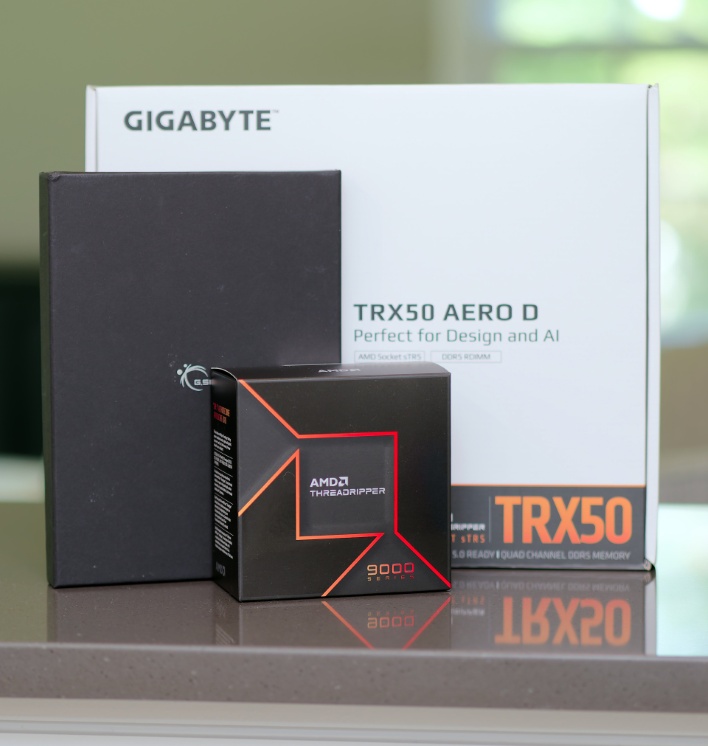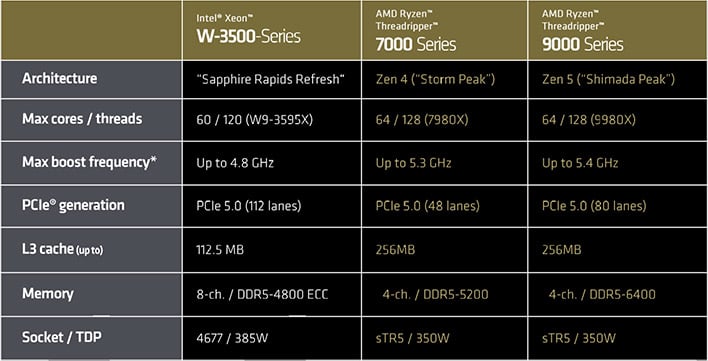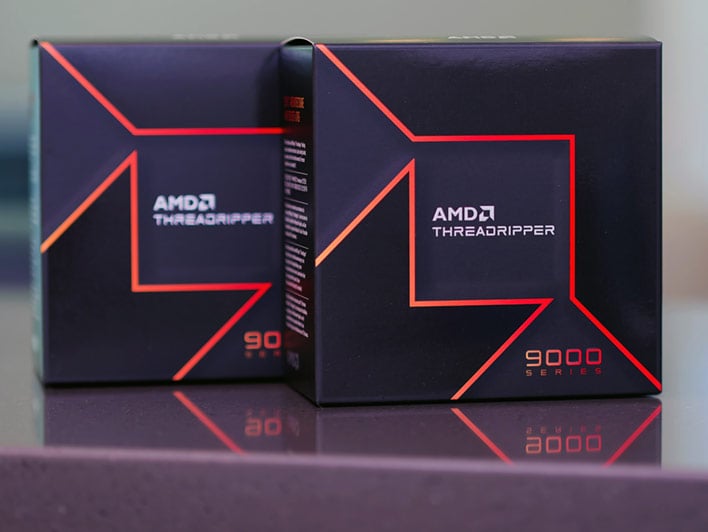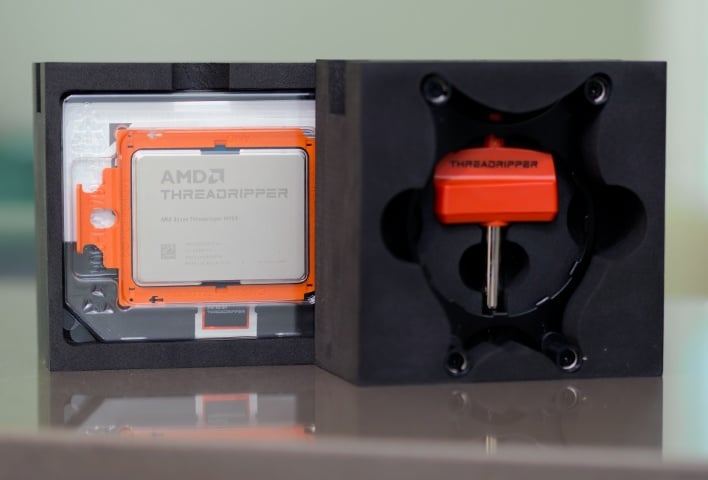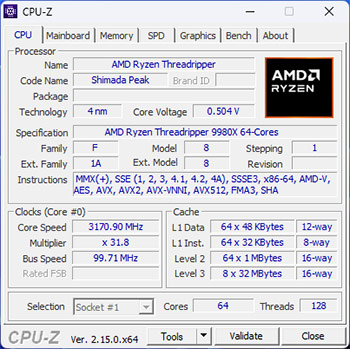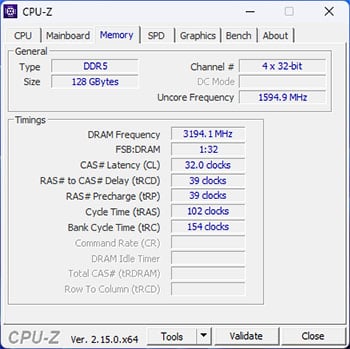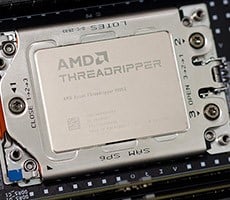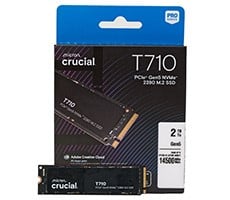AMD Ryzen Threadripper 9980X & 9970X Review: Bountiful Cores, Big Performance
| AMD Ryzen Threadripper 9000 Series: 9980X $4999, 9970X $2499 The Zen 5-based Ryzen Threadripper 9000 series is AMD's most powerful HEDT and workstation processor line-up ever, offering significantly better performance and efficiency than anything in their class.
|
|||

|

|
||
Back during Computex in June, AMD first announced its Ryzen Threadripper 9000 series many-core processors. Right out of the gate, we knew what these CPUs were all about, but to quickly recap, they’re updated, Zen 5-based HEDT and professional workstation processors, which supplant the Zen 4-based Ryzen Threadripper 7000 series. Core counts up and down the stack remain similar, but thanks to the newer Zen 5 architecture and a few additional updates, the Ryzen Threadripper 9000 series should offer significantly more performance, better efficiency, and additional IO connectivity.
To date, we’ve already covered the original announcement, pricing of the top-end Threadripper Pro 9000 series chips, and covered the entire architecture and product line-up. As such, we’re not going to cover all of those details again here, but it does mean you’ve got some reading to do, if you’re not already up to speed...
- AMD Unveils Zen 5 Threadripper 9000 CPUs With Up To 96 Cores
- AMD Confirms Ryzen Threadripper Pro 9000WX Pricing
- AMD Threadripper 9000 And Radeon AI Pro 9000 Details
There is still plenty of new information to share regarding these new Threadrippers, however, including a myriad of fresh benchmarks run on the 64-core Ryzen Threadripper 9980X and its sibling the 32-core Ryzen Threadripper 9970X, which is what we have in store for you today. Before we get to the numbers though, let’s cover a few additional details and recap a couple of high-level tidbits.
As we’ve mentioned in the past, the Ryzen Threadripper 9000 series is compatible with existing TRX50 and WRX90 chipsets and motherboards, and they drop right into the same sTR5 socket as the Threadripper 7000 series. That means the ecosystem of motherboards, coolers and other accessories already on the market is nice and mature, which is to say most of the kinks have been worked out by now. Not all, of course; these new processors will usher in a fresh AMD AGESA and many BIOS/UEFI updates, but stability, compatibility, and long-term reliability should be expected from the platform at this point, right out of the box. Many of the woes that often affect early adopters of new computing platforms shouldn’t be an issue with Threadripper 9000.
How Does The Threadripper 9000 Series Stack Up?
To quickly recap how the Threadripper 9000 series (not the 9000 Pro series) stacks up relative to the 7000s and Intel’s competitive Xeon W series, we’ve got a quick table to share. Versus Intel’s Xeon W, AMD’s got the advantage in max core count, max boost frequency, L3 cache, and spec’d memory speed (not accounting for overclocking). Some Xeon W configurations offer more Gen 5 PCIe lanes, however, and the chips support up to 8-channles of memory. Standard Threadripper 9000s support “only” 4 memory channels, but the Threadripper Pro 9000 support up to 8 channels as well, when paired with a WRX90-based motherboard.
When compared to the Threadripper 7000 series, it seems like not much has changed. Maximum frequencies are slightly higher, but core counts, cache, and PCIe connectivity remain the same. The Threadripper 9000 does officially support much faster memory speeds, however, and Zen 5 offers a number of advantages over Zen 4. You read our deep give into the architecture, right?
Threadripper 9000 series processors also look similar to previous-gen Threadrippers. Save for the branding on their heat spreaders, there’s not much to differentiate the processors. AMD has tweaked their retail packaging, though. Gone are the elaborate Threadripper boxes and pedestals of older models, and in their place are modern, minimalist boxes with simplified branding and graphics.
The bundles included with the processors remain the same, however. Included with Threadripper 9000 series processors, you’ll find a basic lit pack, a Threadripper decal, a torx torque wrench, to ensure you’re installing the chip into its socket with the correct pressure, and a screw mount for round-head, Asetek-style TR5 liquid coolers.
Threadripper 9000 Series CPU-Z Details
As you can see in the CPU-Z screenshots above, there is 80K of L1 per core (48K D-Cache [12-way] + 32K I-Cache [8-way]), which is an increase from 64K on Zen 4 / Threadripper 7000. There’s also 1MB of L2 cache per core, which is 16-way set associative. The L1 D-cache and L2 on Zen 4 / Threadripper 7000 chips were both 8-way set associative. There’s also 32MB of L3 cache per compute die, for 256MB total on the Threadripper 9980X, which is composed of 8 x 8 core compute dies (64C / 128T). Lower core count Threadrippers will obviously have less total cache, due to the fewer number of active compute dies on the chips.
And with that, what do you say we go find out how these monstrous, many-core chips perform?

